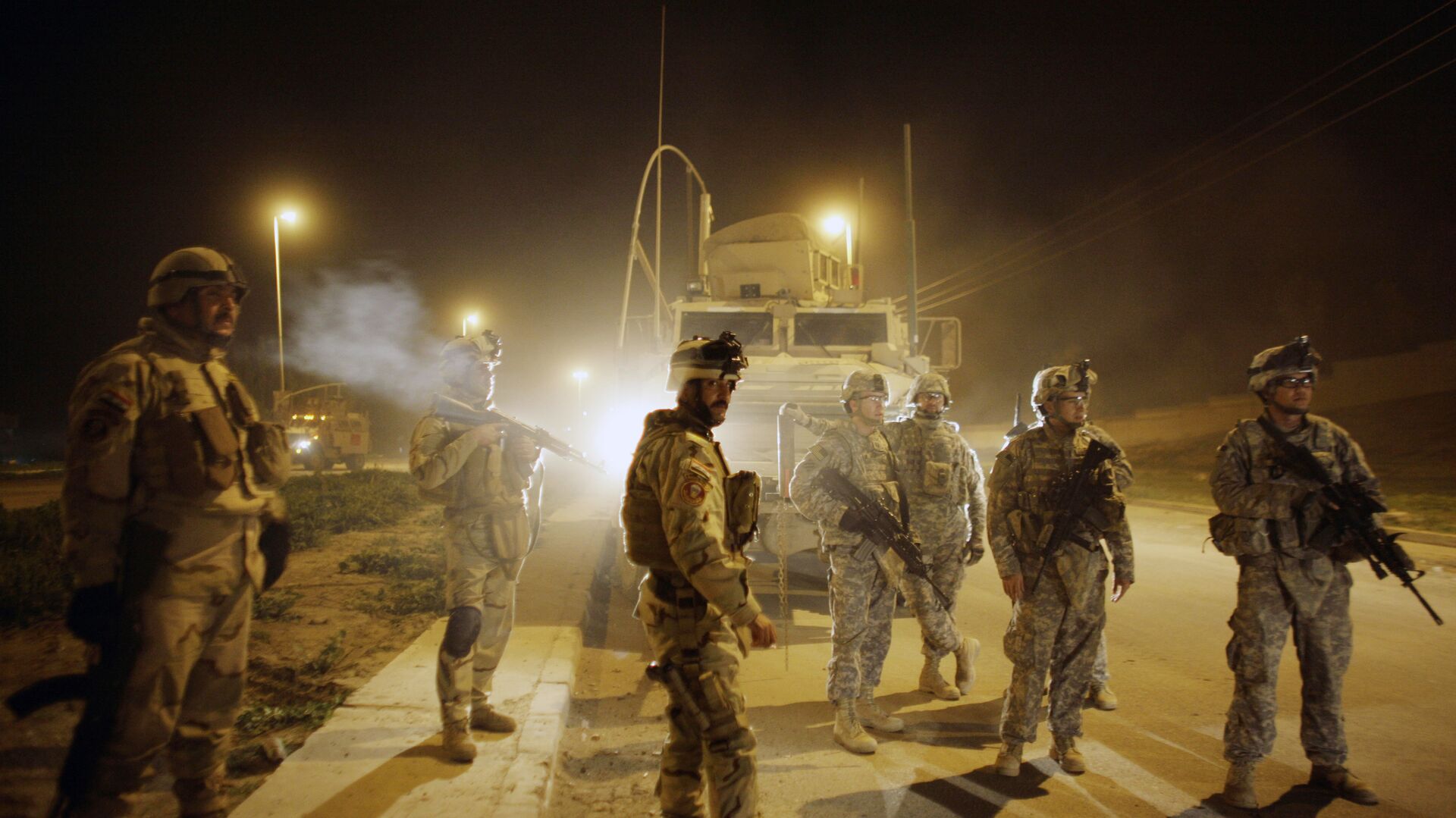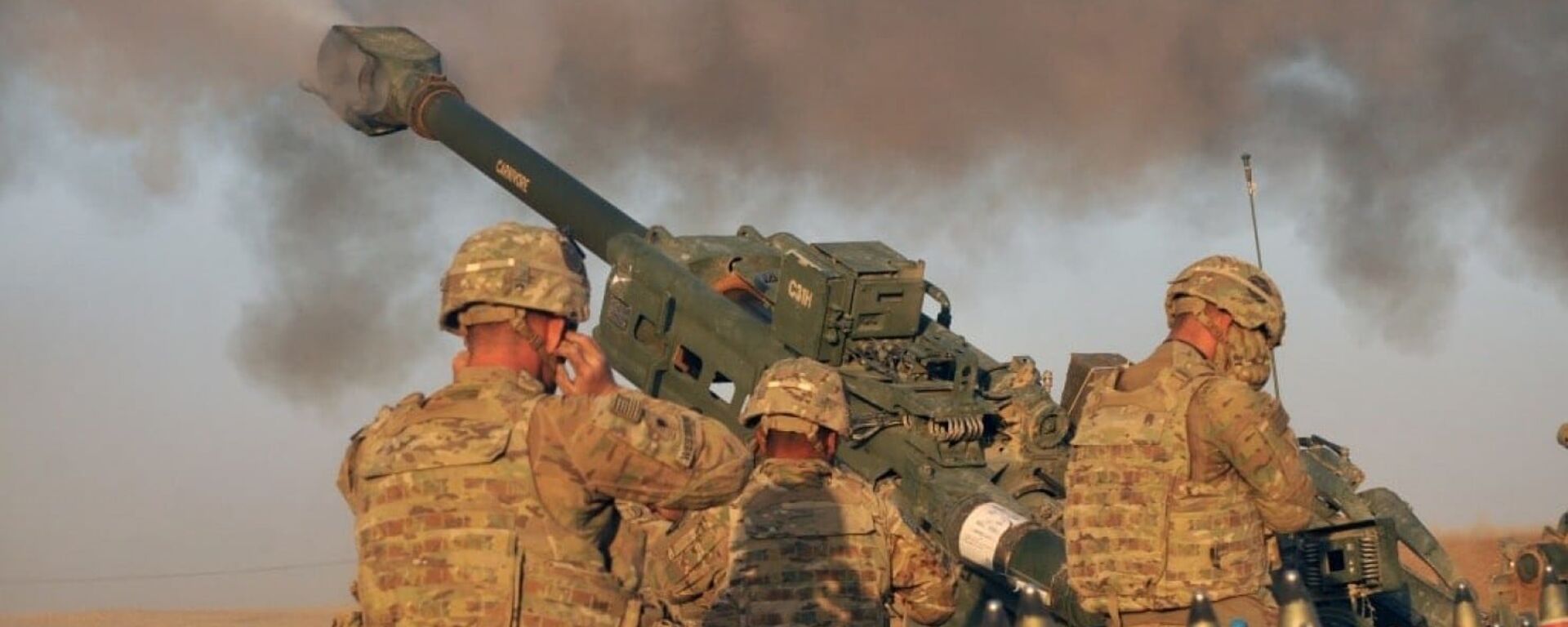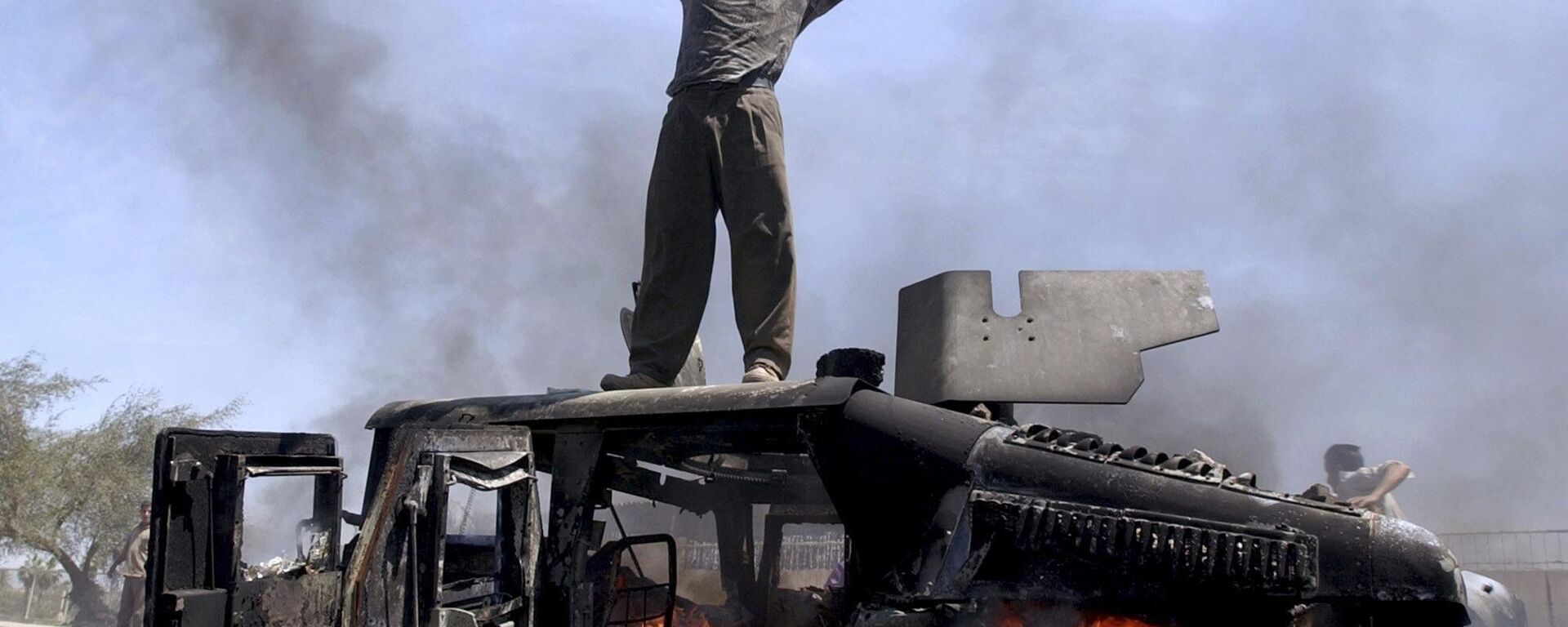https://sputnikglobe.com/20230320/the-us-learned-absolutely-nothing-from-iraq-1108602479.html
The US Learned Absolutely Nothing From Iraq
The US Learned Absolutely Nothing From Iraq
Sputnik International
In March 2003, the United States launched an invasion of Iraq on false pretenses and without a clear long-term strategy. Twenty years later, it is repeating many of the same mistakes in Ukraine.
2023-03-20T15:00+0000
2023-03-20T15:00+0000
2023-03-20T15:00+0000
20 years since us invasion of iraq
iraq
iraq war
2003 invasion of iraq
war in iraq
us
https://cdn1.img.sputnikglobe.com/img/104295/03/1042950353_0:212:4278:2618_1920x0_80_0_0_f91bc29adcff0627d9fe833bdb492a6a.jpg
This time, however, the stakes are much higher. The United States is no longer the undisputed superpower that it was in the early 2000s. Two decades of failed military interventions abroad, poor economic governance at home, and dysfunctional culture wars have significantly undermined its potential.Iraq was a costly mistake, but Ukraine has the potential to be something much worse. By waging a proxy war against Russia in Ukraine, the United States risks becoming drawn into a direct confrontation with another nuclear power. The recent MQ-9 Reaper incident demonstrates that instead of trying to avoid such a dangerous escalation, Washington is taking ever-more provocative actions against Russia. Such a reckless attitude is a recipe for disaster.IraqMore than a decade before the invasion of Iraq, senior US officials kicked-off a large-scale propaganda campaign depicting Saddam Hussein as the modern embodiment of evil. They denounced Hussein, who had been a trusted American ally in the 1980s, as a brutal dictator whose troops murdered Kuwaiti babies by throwing them out of incubators. They insisted that the Iraqi leader was secretly developing weapons of mass destruction and collaborating with the al-Qaeda* terrorist group. They went so far as to compare Hussein to Adolf Hitler, arguing that Iraq posed an immediate threat to the Middle East, but also to the United States and the rest of the “civilized world.”All these claims were blatant lies. In the lead up to the Iraq War, the US government manipulated and sometimes outright fabricated data used to justify military intervention. Analysts within the Pentagon and US intelligence agencies were instructed to write briefings according to talking-points developed by senior George W. Bush Bush administration officials. The US media was an active accomplice in selling the Iraq War to the American public. Intelligence officials leaked cherry-picked, unreliable data to major newspapers such as the Washington Post and New York Times, who published it on their front pages without any independent verification. Meanwhile, cable news outlets flooded the airwaves with supporters of the Iraq War, including many retired generals.Skeptics of the war were angrily denounced as “unpatriotic” and “pro-Saddam.” In some cases, they were threatened with professional and even legal reprisals for their dissent. One illustrative example is Scott Ritter, who served as the United Nations chief weapons inspector for Iraq from 1991 to 1998. Ritter told Sputnik that the FBI began harassing him and his family in 1996. When he resigned from his position two years later over the Bill Clinton administration’s interference with his inspections, the agency leaked false accusations to the press about him handing classified information to the Israelis. That lie sparked a three-year legal investigation against Ritter, including on charges punishable by the death penalty. Although his name was eventually cleared, the ordeal came at a heavy professional cost for Ritter.Proponents of the invasion promised a quick, decisive victory. Their optimism didn’t seem too far-fetched at first. In less than six weeks after the war started, the United States defeated the Iraqi military, captured Baghdad, and disposed of Hussein along with the rest of his senior leadership. This triumphant blitzkrieg prompted the Bush administration to move onto even grander ambitions. Many senior officials began speaking of Iraq as a potential democratic beacon in the Middle East, the beachhead from which they would transform the entire region along the lines of liberal ideology.The euphoria did not last long, however. Although the Bush administration was able to quickly crush Baathist Iraq on the battlefield, it had no clear strategy for managing or rebuilding the country. Instead of becoming a democratic utopia, Iraq was soon torn apart at the seams by sectarian violence. The Bush administration tried throwing money and additional troops at the problem, but without much success. The situation on the ground continued to degrade until it hit a new boiling point in summer of 2014, when hundreds of Daesh** fighters in pickup trucks routed the US-trained Iraqi army and captured nearly one third of the country’s territory. To add insult to injury, the jihadists not only seized Iraq’s second largest city of Mosul and strategic oil fields, but also large amounts of US weaponry and ammunition.This begs the natural question: What exactly did the United States achieve in Iraq? Although Washington spent nearly $2 trillion and sacrificed more than 4,000 American soldiers in Iraq, it has no real positive accomplishments to show for it. The debacle exposed the incompetence of the US political and military leadership. Despite possessing the world’s largest economy and most powerful army, the Bush administration was defeated by rag-tag militias carrying Kalashnikov rifles. To make matters even worse for Washington, the geopolitical standing of the US in the Middle East is weaker in 2023 than it was in 2003. The recent Chinese-brokered diplomatic deal between Saudi Arabia and Iran is just the latest sign that the era of American hegemony in the region is coming to an end.UkraineTwenty years after the Iraq invasion, the US foreign policy establishment is attempting to use the same playbook in Ukraine. Just like it did with Iraq, Washington has sought to frame the conflict not only as a manichean struggle of good against evil. During his State of the Union address last year, US President Joe Biden declared that the fight between Ukraine and Russia was “a great battle for freedom: a battle between democracy and autocracy.” Needless to say, Biden conveniently omitted the fact that the “democratic” Kiev regime has shut down opposition political parties and television channels, actively persecuted Orthodox Christians, and restricted its ethnic Russian citizens from speaking their own language.Another tactic from the Iraq repertoire has been to depict the Ukraine conflict as an existential crisis for the West. US top general Mark Milley told reporters last year that Russia’s victory over the Kiev regime would put the entire “global international security order” at risk. Milley did not attempt to provide any explanation for why Ukraine, a country notorious for political dysfunction and corruption, supposedly held the key to international peace and stability. Furthermore, if the “global international security order” is truly so fragile that its survival depends on a loose-cannon like Ukraine, then why is such an order worth saving in the first place?Instead of posing these obvious questions to Washington policymakers, the mainstream media decided to once again serve as their propaganda machine. Ever since the beginning of Russia’s special military operation in Ukraine last year, the press has uncritically reported information received from the Pentagon, US intelligence officials, and the Kiev regime. At the same time, it has shamelessly accused skeptics of the US proxy war in Ukraine of “parroting Russian talking points” and acting as “Putin apologists.”Just as in the lead up to Iraq, US officials assured their public that they could achieve victory at little cost. They promised that Western-led sanctions would collapse the Russian economy and bring the country’s military-industrial complex to a grinding halt. As the Biden White House put it, “Russia will very likely lose its status as a major economy, and it will continue a long descent into economic, financial, and technological isolation.” Simultaneously, many US analysts openly expressed hope that economic unrest would help to fuel either massive street protests or an elite coup in Russia.However, this economic blitzkrieg strategy ended in total failure. Despite unprecedented sanctions, the Russian economy only experienced a minor downturn (2.5%) last year and is on pace to grow at a faster rate than Germany and the United Kingdom in 2023. Far from becoming an international pariah, Russia successfully moved to strengthen its cooperation with non-Western powers such as China, India, and Iran. Instead of political instability, Putin’s domestic support increased to its highest level in years, with a recent poll from Russian Public Opinion Research Center showing that 76% of respondents approve of his performance.Notwithstanding these failures, Biden has pledged to support Ukraine “as long as it takes.” That is easier said than done. Top US and NATO officials have begun sounding the alarm in recent months that the current level of arms shipments to Ukraine is not sustainable in the long run. Earlier this year, David T. Pyne, former US Army combat arms and headquarters staff officer, told Sputnik it could take decades to remedy some of the shortages caused by the US proxy war in Ukraine.Growing domestic political pressure could also force Washington to draw down American involvement in Ukraine just as it did in Iraq. An AP-NORC Center for Public Affairs Research poll last month showed that just 48% of Americans support continued weapons shipments to Ukraine, down from 60% in May 2022. Skepticism on Ukraine is also increasingly drawing support from Republican politicians such as former president Donald Trump, Florida Governor Ron DeSantis, and numerous conservative lawmakers.The United States allocated more than $113 billion to Ukraine in 2022, more than twice the amount it spent on Iraq during the first year of the war. How much longer will American taxpayers be willing to write out such massive checks to Ukraine all the while their standard of living continues to visibly worsen each year? Especially if the current banking crisis sweeping the United States and Western Europe turns into a global recession?Why History Repeats ItselfFor any healthy political system to learn from its mistakes, it needs to hold the people in charge accountable. The opposite has happened in the United States.Not only were the architects of the Iraq War not punished, many were promoted. Biden, who helped spearhead the Iraq invasion as chairman of the US Senate Foreign Relations Committee, was chosen by Barack Obama to become his Vice President in 2008. Twelve years later, Biden himself was elected President of the United States.Washington, DC has become an anti-meritocracy in which well-connected conformists are rewarded for their failures, while patriotic dissenters are demonized and marginalized. Unless that changes, the United States will continue marching from one foreign policy disaster to another.
https://sputnikglobe.com/20230319/abu-ghraib-horrors-of-us-occupation-of-iraq-1108563125.html
https://sputnikglobe.com/20230319/us-nurtured-plans-of-destroying-iraq-years-before-2003-invasion-ex-official-says-1108572318.html
https://sputnikglobe.com/20230315/nato-game-us-may-directly-meddle-in-ukrainian-conflict-seymour-hersh-warns---1108410661.html
iraq
Sputnik International
feedback@sputniknews.com
+74956456601
MIA „Rossiya Segodnya“
2023
Sputnik International
feedback@sputniknews.com
+74956456601
MIA „Rossiya Segodnya“
News
en_EN
Sputnik International
feedback@sputniknews.com
+74956456601
MIA „Rossiya Segodnya“
Sputnik International
feedback@sputniknews.com
+74956456601
MIA „Rossiya Segodnya“
united states launched an invasion, invasion of iraq, long-term strategy
united states launched an invasion, invasion of iraq, long-term strategy
The US Learned Absolutely Nothing From Iraq
Simes Dimitri
Deputy Director of Sputnik's English-language Department
In March 2003, the United States launched an invasion of Iraq on false pretenses and without a clear long-term strategy. Twenty years later, it is repeating many of the same mistakes in Ukraine.
This time, however, the stakes are much higher. The United States is no longer the undisputed superpower that it was in the early 2000s. Two decades of failed military interventions abroad, poor economic governance at home, and dysfunctional culture wars have significantly undermined its potential.
Iraq was a costly mistake, but Ukraine has the potential to be something much worse. By waging a proxy war against Russia in Ukraine, the United States risks becoming drawn into a direct confrontation with another nuclear power. The recent MQ-9 Reaper incident demonstrates that instead of trying to avoid such a dangerous escalation, Washington is taking ever-more provocative actions against Russia. Such a reckless attitude is a recipe for disaster.
More than a decade before the invasion of Iraq, senior US officials kicked-off a large-scale propaganda campaign depicting Saddam Hussein as the modern embodiment of evil. They denounced Hussein, who had been a trusted American ally in the 1980s, as a brutal dictator whose troops murdered Kuwaiti babies by throwing them out of incubators. They insisted that the Iraqi leader was secretly developing weapons of mass destruction and collaborating with the al-Qaeda* terrorist group. They went so far as to compare Hussein to Adolf Hitler, arguing that Iraq posed an immediate threat to the Middle East, but also to the United States and the rest of the “civilized world.”
All these claims were blatant lies. In the lead up to the Iraq War, the US government manipulated and sometimes outright fabricated data used to justify military intervention. Analysts within the Pentagon and US intelligence agencies were
instructed to write briefings according to talking-points developed by senior George W. Bush Bush administration officials. The US media was an active accomplice in selling the Iraq War to the American public. Intelligence officials leaked cherry-picked, unreliable data to major newspapers such as the
Washington Post and
New York Times, who published it on their front pages without any independent verification. Meanwhile, cable news outlets flooded the airwaves with supporters of the Iraq War, including many retired generals.
Skeptics of the war were angrily denounced as “unpatriotic” and “pro-Saddam.” In some cases, they were threatened with professional and even legal reprisals for their dissent. One illustrative example is Scott Ritter, who served as the United Nations chief weapons inspector for Iraq from 1991 to 1998. Ritter
told Sputnik that the FBI began harassing him and his family in 1996. When he resigned from his position two years later over the Bill Clinton administration’s interference with his inspections, the agency leaked false accusations to the press about him handing classified information to the Israelis. That lie sparked a three-year legal investigation against Ritter, including on charges punishable by the death penalty. Although his name was eventually cleared, the ordeal came at a heavy professional cost for Ritter.
Proponents of the invasion promised a quick, decisive victory. Their optimism didn’t seem too far-fetched at first. In less than six weeks after the war started, the United States defeated the Iraqi military, captured Baghdad, and disposed of Hussein along with the rest of his senior leadership. This triumphant blitzkrieg prompted the Bush administration to move onto even grander ambitions. Many senior officials began speaking of Iraq as a potential democratic beacon in the Middle East, the beachhead from which they would transform the entire region along the lines of liberal ideology.
The euphoria did not last long, however. Although the Bush administration was able to quickly crush Baathist Iraq on the battlefield, it had no clear strategy for managing or rebuilding the country. Instead of becoming a democratic utopia, Iraq was soon torn apart at the seams by sectarian violence. The Bush administration tried throwing money and additional troops at the problem, but without much success. The situation on the ground continued to degrade until it hit a new boiling point in summer of 2014, when hundreds of Daesh** fighters in pickup trucks routed the US-trained Iraqi army and captured nearly one third of the country’s territory. To add insult to injury, the jihadists not only seized Iraq’s second largest city of Mosul and strategic oil fields, but also large amounts of US weaponry and ammunition.
This begs the natural question: What exactly did the United States achieve in Iraq? Although Washington spent nearly $2 trillion and sacrificed more than 4,000 American soldiers in Iraq, it has no real positive accomplishments to show for it. The debacle exposed the incompetence of the US political and military leadership. Despite possessing the world’s largest economy and most powerful army, the Bush administration was defeated by rag-tag militias carrying Kalashnikov rifles. To make matters even worse for Washington, the geopolitical standing of the US in the Middle East is weaker in 2023 than it was in 2003. The recent Chinese-brokered diplomatic
deal between Saudi Arabia and Iran is just the latest sign that the era of American hegemony in the region is coming to an end.
Twenty years after the Iraq invasion, the US foreign policy establishment is attempting to use the same playbook in Ukraine. Just like it did with Iraq, Washington has sought to frame the conflict not only as a manichean struggle of good against evil. During his State of the Union address last year, US President Joe Biden declared that the fight between Ukraine and Russia was “a great battle for freedom: a battle between democracy and autocracy.” Needless to say, Biden conveniently omitted the fact that the “democratic” Kiev regime has shut down opposition political parties and television channels, actively persecuted Orthodox Christians, and restricted its ethnic Russian citizens from speaking their own language.
Another tactic from the Iraq repertoire has been to depict the Ukraine conflict as an existential crisis for the West. US top general Mark Milley told reporters last year that Russia’s victory over the Kiev regime would put the entire “global international security order” at risk. Milley did not attempt to provide any explanation for why Ukraine, a country notorious for political dysfunction and corruption, supposedly held the key to international peace and stability. Furthermore, if the “global international security order” is truly so fragile that its survival depends on a loose-cannon like Ukraine, then why is such an order worth saving in the first place?
Instead of posing these obvious questions to Washington policymakers, the mainstream media decided to once again serve as their propaganda machine. Ever since the beginning of Russia’s special military operation in Ukraine last year, the press has uncritically reported information received from the Pentagon, US intelligence officials, and the Kiev regime. At the same time, it has shamelessly accused skeptics of the US proxy war in Ukraine of “parroting Russian talking points” and acting as “Putin apologists.”
Just as in the lead up to Iraq, US officials assured their public that they could achieve victory at little cost. They promised that Western-led sanctions would collapse the Russian economy and bring the country’s military-industrial complex to a grinding halt. As the Biden White House put it, “Russia will very likely lose its status as a major economy, and it will continue a long descent into economic, financial, and technological isolation.” Simultaneously, many US analysts openly expressed hope that economic unrest would help to fuel either massive street protests or an elite coup in Russia.
However, this economic blitzkrieg strategy ended in total failure. Despite unprecedented sanctions, the Russian economy only
experienced a minor downturn (2.5%) last year and is on pace to grow at a faster rate than Germany and the United Kingdom in 2023. Far from becoming an international pariah, Russia successfully moved to strengthen its cooperation with non-Western powers such as China, India, and Iran. Instead of political instability, Putin’s domestic support increased to its highest level in years, with a recent poll from Russian Public Opinion Research Center
showing that 76% of respondents approve of his performance.
Notwithstanding these failures, Biden has
pledged to support Ukraine “as long as it takes.” That is easier said than done. Top US and NATO officials have begun
sounding the alarm in recent months that the current level of arms shipments to Ukraine is not sustainable in the long run. Earlier this year, David T. Pyne, former US Army combat arms and headquarters staff officer,
told Sputnik it could take decades to remedy some of the shortages caused by the US proxy war in Ukraine.
Growing domestic political pressure could also force Washington to draw down American involvement in Ukraine just as it did in Iraq. An AP-NORC Center for Public Affairs Research poll last month
showed that just 48% of Americans support continued weapons shipments to Ukraine, down from 60% in May 2022. Skepticism on Ukraine is also increasingly drawing support from Republican politicians such as former president Donald Trump, Florida Governor Ron DeSantis, and numerous conservative lawmakers.
The United States allocated more than $113 billion to Ukraine in 2022, more than twice the amount it spent on Iraq during the first year of the war. How much longer will American taxpayers be willing to write out such massive checks to Ukraine all the while their standard of living continues to visibly worsen each year? Especially if the current banking crisis sweeping the United States and Western Europe turns into a global recession?
Why History Repeats Itself
For any healthy political system to learn from its mistakes, it needs to hold the people in charge accountable. The opposite has happened in the United States.
Not only were the architects of the Iraq War not punished, many were promoted. Biden, who helped spearhead the Iraq invasion as chairman of the US Senate Foreign Relations Committee, was chosen by Barack Obama to become his Vice President in 2008. Twelve years later, Biden himself was elected President of the United States.
Washington, DC has become an anti-meritocracy in which well-connected conformists are rewarded for their failures, while patriotic dissenters are demonized and marginalized. Unless that changes, the United States will continue marching from one foreign policy disaster to another.





